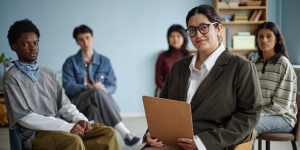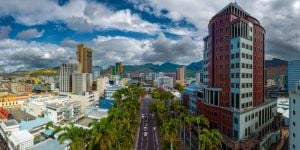
Her Excellency Dr Kate O’Shaughnessy is the fifth consecutive female Australian High Commissioner to Mauritius and Seychelles and Ambassador to Madagascar and Comoros. On the occasion of International Women’s Day 2021, we asked her thoughts about women in the diplomatic world and in decision-making.
Can you briefly introduce yourself and tell us about your background?
My name is Dr Kate O'Shaughnessy. I'm the Australian High Commissioner to Mauritius and Seychelles, and Ambassador to Madagascar and Comoros. I'm a career diplomat, and have served in Ghana, as well as shorter assignments in Nigeria, Niger, Lebanon and France.
I grew up in a small mining town in Western Australia, called Kalgoorlie, but moved away when I was 18 to pursue university studies in history and Indonesian language. These studies led to work in historical research, museums, and later academia. Diplomacy came later – in my 30s.
When did you first arrive in Mauritius? What brought you here?
I arrived in Mauritius in August 2020. I had applied for the role here because as an Australian from the western side of my country, looking directly across the Indian Ocean towards Mauritius, I felt that I might be able to bring a unique perspective on opportunities for partnerships and collaborations. But I must say that the role is highly sought-after, and I did not expect to receive that call in late 2019 offering me the job!
The position you are currently occupying today has been held by a couple of women before. Since this is not customary for other countries, what do you have to say about the importance of women for the Australian government?
I'm very proud to be the fifth consecutive female Australian High Commissioner here in Mauritius – following on from Jenny Dee, Susan Coles, Sandra Vegting, and Cathy Johnstone.
On the importance of women in leadership in Australia, I would say two things. The first is that gender equality is at the heart of our foreign policy. Our Foreign Minister, Senator Marise Payne, is also the Minister for Women.
The second point though is that Australia doesn't see itself as having all the answers on gender inclusivity. We know that we are on a continuing journey to ensure women's voices are included in all areas of society. In my own organisation, the Department of Foreign Affairs and Trade, just six years ago we had just 25 per cent of Ambassadorial or senior management roles held by women. This was despite recruiting 50 per cent men and 50 per cent women since 1980. We achieved 40 per cent female leaders in 2020, through setting targets, mentoring women and encouraging greater transparency in our recruitment and promotion processes. It's taken dedicated effort by both men and women.
You are the holder of a PhD and a Bachelor of Arts (Honours) from The University of Western Australia. What were your career aspirations at the time? Did you ever see yourself as a High Commissioner one day?
At the time, I hoped to become an academic and continue a career in research and teaching. But by the time I had completed doctoral fieldwork in Indonesia, I realised I wanted to continue learning about other countries and cultures, and diplomacy seemed like a better fit.
On a whim, I applied for a graduate-trainee role at the Department of Foreign Affairs and Trade in Canberra. I never expected to be successful, and I certainly never expected that I might be a High Commissioner in the future.
Have you ever faced any resistance from your peers regarding this position?
I would say the resistance I've experienced has not been towards me personally, but rather towards the idea of women in leadership at all. When my organisation's Women in Leadership strategy was launched in 2015, male colleagues worried that this would lead to discrimination against men, and that such a policy was not necessary. They would say “just choose the best person for the job.”
But that strategy wasn't about starting to discriminate against men. It was about stopping discrimination against women. One of the best ways we can do that in a leadership context, is by recognising that leadership comes in all forms. Men and women can lead in different ways – that's not bad, it's just different. In the end, there's usually lots of “best people for the job.” And we only find those “best people” if we value a diversity of working styles and perspectives.
What are your views on the modern Mauritian woman? In your opinion, what needs to be done at the government level to help them thrive as professionals, women in business or women in politics?
I've been privileged to meet many dynamic and impressive Mauritian women in the short time I have been here. I think the struggles Mauritian women face in having their voices heard are struggles shared by women around the world, including in Australia.
I don't think the answers lie in one institution coming up with a solution – whether that be government, business or the community. The answer lies within all of us, to recognise that women are 50 per cent of the community, and ask ourselves what small actions we can each take in our daily life to ensure that women and girls are included in whatever it is that we are working on.
Men have such an important role to play in this work – very often they are the ones holding leadership roles in the community, in business, and in government. When male leaders set an example, others follow.
In your opinion, what is the importance of strengthening the position of women in decision-making in the diplomatic world?
Women have a critical role to play in the diplomatic world. The most challenging foreign policy questions in the 21st century – dealing with climate change, the COVID pandemic, food security and poverty – are all issues that affect men and women equally. If the international community is to have any hope of finding solutions to these challenges, we need to bring together the best minds from around the world. We cannot risk limiting our talent pool to just 50 per cent of the community.
What would you advise women who would like to pursue a diplomatic career?
I would encourage any women interested in a diplomatic career to do it. Do not underestimate your own talents and skills or assume that your male colleague knows more than you just because he sounds more authoritative. You likely know much more than you think you do.
Be prepared for challenging times – it's not an easy job. But each woman will bring her own unique perspectives and experiences to the role, and if there's any field of work that needs a diversity of perspectives, it's foreign affairs!



















